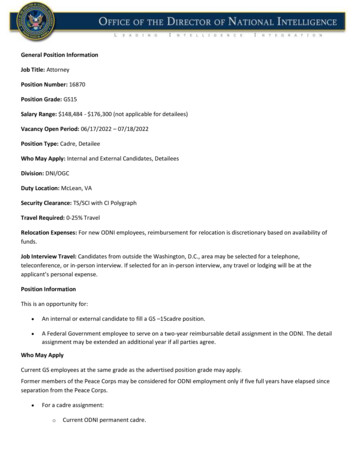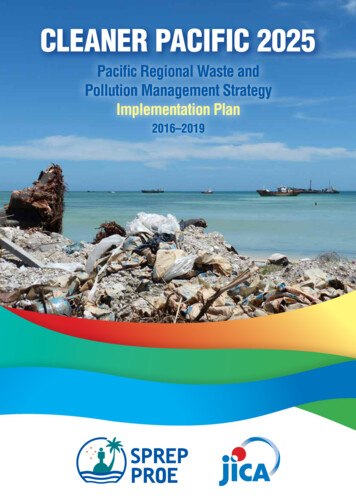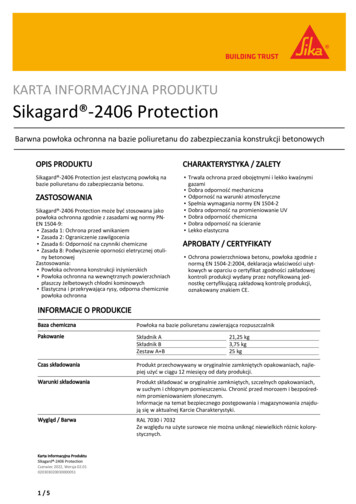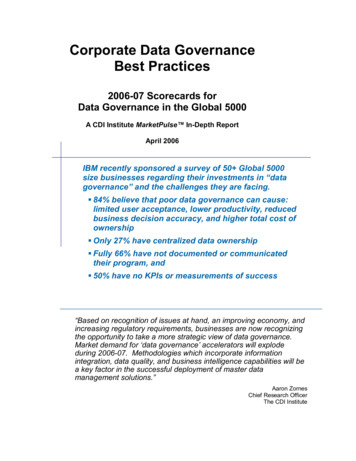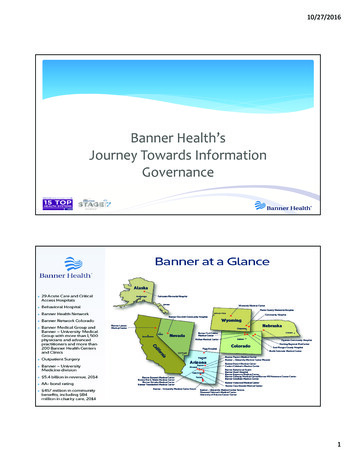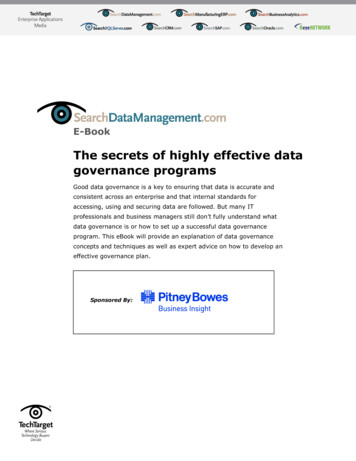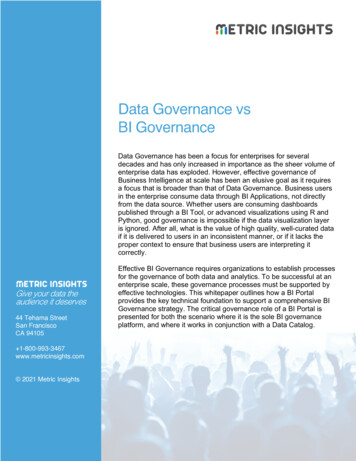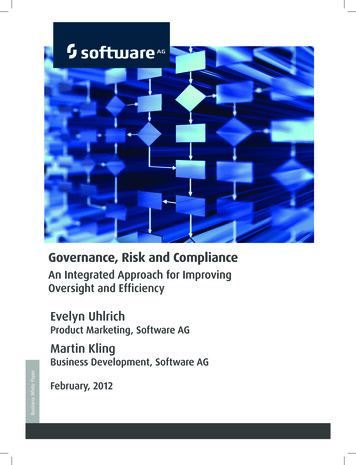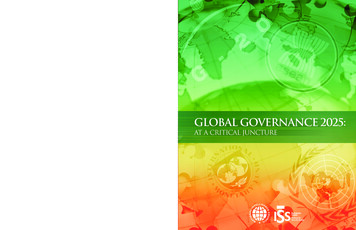
Transcription
Global Governance 2025:at a Critical JunctureNIC 2010-08September 2010
This page was intentionally left blank.This page was intentionally left blank.
Global Governance 2025:At a Critical JunctureInquiries regarding this report may be made to Mathew Burrows,Counselor to the National Intelligence Council, on (703) 482-0741and to the EU Institute of Security Studies on 0033-1-56-89-19-51.NIC 2010-08September 2010
This page was intentionally left blank.
PrefaceThe United States’ National Intelligence Council (NIC) and the European Union’s Institute forSecurity Studies (EUISS) have joined forces to produce this assessment of the long-term prospectsfor global governance frameworks. This exercise builds on the experience of the two institutions inidentifying the key trends shaping the future international system. Since the mid 1990s, the NIC hasproduced four editions of its landmark Global Trends report. The most recent one, Global Trends2025: A Transformed World, published in late 2008, noted that momentous change was ahead, withthe gap between increasing disorder and weakening governance structures widening. The EUISSproduced the first EU-level report on the factors affecting the evolution of the international systemin 2006, The New Global Puzzle. What World for the EU in 2025? The report stressed that amultipolar system is emerging and that matching the new distribution of power with new rules andinstitutions will be critical to preserving international peace and stability.The US and the EU do not always see eye to eye on every issue on the international agenda, butthey share fundamental values and strategic interests to an extent not matched by any other partnersin the world. Transatlantic agreement is no longer enough to effectively manage global challenges.Doing so will require renewed efforts to address governance gaps and strengthen multilateralism, inpartnership with other pivotal centers of power and with the international community at large.This report provides an informal contribution to an important international debate on the wayforward for global, regional, and bilateral institutions and frameworks to meet emerging challenges.It is not meant as an exhaustive report card evaluating the performance of individual institutions.While not being policy prescriptive, the report shares a strong belief—as exemplified bymultilateralist approaches of the US and EU governments to resolving global problems such as therecent financial crisis—that global challenges will require global solutions.The report does not seek to examine all the various challenges likely to require multilateralist efforts,but rather highlights several important governance gaps. We therefore do not go into depth onproliferation or cybersecurity—which we believe are receiving greater attention. Instead, we focuson such issues as intrastate conflict, resource management, migration, and biotechnology. Althoughrecognized by many as ongoing challenges, we believe the long-term impact of these issues on thestrength of the international order has not been fully appreciated.Global Governance 2025 is the result of an inclusive process, enriched by wide-rangingconsultations with government officials; as well as business, academic, NGO, and think tank leaders;and media representatives in Brazil, China, India, Japan, Russia, South Africa, and in the Gulf region(the UAE). The diversity of the comments and insights, which we have included in the body of thetext, testifies both to the richness of the debate and to the difficulty of reconciling different interestsand standpoints when reforming global governance. A number of experts, acknowledged elsewhere,have contributed to the success of this project and to the high quality of this report. The AtlanticCouncil of the US and the Transatlantic Policy Network have been partners in supporting the project.NIC Counselor Mathew Burrows and Giovanni Grevi from the EUISS have steered this process andtook charge of drafting the bulk of the report. Their work has set an excellent example of cooperationin delivering joint analysis and achieving a largely shared perspective.The Global Governance 2025 project is innovative in many respects. This is the first time the NIChas jointly developed and produced an unclassified report with a non-US body. Global Governance2025 provides an important step with a view to future joint projects on matters of common interest.443755ID 9-10i
This page was intentionally left blank.ii
Executive SummaryGlobal governance—the collective management of common problems at the internationallevel—is at a critical juncture. Although global governance institutions have racked up manysuccesses since their development after the Second World War, the growing number of issues onthe international agenda, and their complexity, is outpacing the ability of internationalorganizations and national governments to cope.With the emergence of rapid globalization, the risks to the international system have grown tothe extent that formerly localized threats are no longer locally containable but are nowpotentially dangerous to global security and stability. At the beginning of the century, threatssuch as ethnic conflicts, infectious diseases, and terrorism as well as a new generation of globalchallenges including climate change, energy security, food and water scarcity, internationalmigration flows, and new technologies are increasingly taking center stage.Three effects of rapid globalization are driving demands for more effective global governance.Interdependence has been a feature of economic globalization for many years, but the rise ofChina, India, Brazil, and other fast-growing economies has taken economic interdependence to anew level. The multiple links among climate change and resources issues; the economic crisis;and state fragility—“hubs” of risks for the future—illustrate the interconnected nature of thechallenges on the international agenda today. Many of the issues cited above involve interwovendomestic and foreign challenges. Domestic politics creates tight constraints on internationalcooperation and reduces the scope for compromise.The shift to a multipolar world is complicating the prospects for effective global governanceover the next 10 years. The expanding economic clout of emerging powers increases theirpolitical influence well beyond their borders. Power is not only shifting from established powersto rising countries and, to some extent, the developing world, but also toward nonstate actors.Diverse perspectives and suspicions about global governance, which is seen as a Westernconcept, will add to the difficulties of effectively mastering the growing number of challenges. Brazilians feel there is a need for a redistribution of power from developed to developingstates. Some experts we consulted saw Brazil tending to like state-centered multilateralism. Many of our Chinese interlocutors see mounting global challenges and fundamental defectsin the international system but emphasize the need for China to deal with its internalproblems. The Chinese envisage a “bigger structure” pulling together the various institutionsand groups that have been established recently. They see the G-20 as being a step forwardbut question whether North-South differences will impede cooperation on issues other thaneconomics.iii
For participants from the Persian Gulf region, the question is what sort of global institutionsare most capable of inclusive power sharing. They bemoaned the lack of strong regionalorganizations. The Indians thought existing international organizations are “grossly inadequate” andworried about an “absence of an internal equilibrium in Asia to ensure stability.” They feltthat India is not well positioned to help develop regional institutions for Asia given China’spreponderant role in the region. Russian experts we consulted see the world in 2025 as still one of great powers but withmore opportunities for transnational cooperation. The Russians worried about the relativelack of “transpacific security.” The United States, Europe, and Russia also have scope forgrowing much closer, while China, “with the biggest economy,” will be the main factor inchanging the world. The South Africans assessed that globalization appears to be strengthening regionalization asopposed to creating a single global polity. They worried that the losers from globalizationincreasingly outnumber the winners.In addition to the shift to a multipolar world, power is also shifting toward nonstate actors, bethey agents or spoilers of cooperation. On a positive note, transnational nongovernmentalorganizations, civil-society groups, churches and faith-based organizations, multinationalcorporations, other business bodies, and interest groups have been equally, if not more effectivethan states at reframing issues and mobilizing publics—a trend we expect to continue. However,hostile nonstate actors such as criminal organizations and terrorist networks, all empowered byexisting and new technologies, can pose serious security threats and compound systemic risks.Many developing countries—which are likely to play an increasing role at the regional andglobal level—also suffer from a relative paucity of nonstate actors, that could help newlyemerging states and their governments deal with the growing transnational challenges.Global governance institutions have adapted to some degree as new issues have emerged, but theadaptations have not necessarily been intentional or substantial enough to keep up with growingdemand. Rather, they have been spurred as much by outside forces as by the institutionsthemselves.The emergence of informal groupings of leading countries, such as the G-20; the prospects forfurther regional cooperation, notably in East Asia; and the multiple contributions of nonstateactors to international cooperation—although highly useful—are unlikely to serve as permanentalternatives to rule-based, inclusive multilateral institutions. Multilateral institutions can deliverpublic goods that summits, nonstate actors and regional frameworks cannot supply, or cannot doso in a reliable way. Our foreign interlocutors stressed the need for decisions enjoying universallegitimacy, norms setting predictable patterns of behavior based on reciprocity, and mutuallyagreed instruments to resolve disputes and redress torts, such as in trade matters.We assess that the multiple and diverse governance frameworks, however flexible, probably arenot going to be sufficient to keep pace with the looming number of transnational and globalchallenges absent extensive institutional reforms and innovations. The capacities of the currentiv
institutional patchwork will be stretched by the type of problems facing the global order over thenext few decades.Numerous studies indicate the growing fragility of many low-income developing states andpotential for more conflict, particularly in cases where civil wars were never fully resolved.Internal conflict or collapse of large populous states on the scale of an Ethiopia, Bangladesh,Pakistan or Nigeria would likely overwhelm international conflict management efforts.Afghanistan, with approximately 28 million people, and Iraq, with 30 million, are among themost populous conflict management cases ever attempted, and they are proving difficult.Regional organizations have performed comparatively few large-scale operational responses tofragile states requiring humanitarian and peacemaking help. Although we can expect increasedpolitical and economic engagement from rising powers—in part a reflection of their increasingglobal interests—emerging powers have deep-seated concerns about the consequences of theproactive management of state fragility.Prevention, for example, often can require direct political intervention or even the threat or useof military force as a last resort. Efforts to prevent conflict have often been slowed by reluctanceand resistance to intervene directly, potentially overriding another country’s sovereignty. Manyexperts in emerging states thought their governments probably would be particularly leery of anyintervention if it is driven by the “West.”Another cluster of problems—the management of energy, food, and water resources—appearsparticularly unlikely to be effectively tackled without major governance innovations. Individualinternational agencies respond to discrete cases, particularly humanitarian emergencies inindividual countries. However, no overall framework exists to manage the interrelated problemsof food, water and energy. The stakes are high in view of the impact that growing scarcitiescould have on undermining the open international system. Resource competition in which majorpowers seek to secure reliable supplies could lead to a breakdown in cooperation in other areas.Moreover, scarcities are likely to hit poor states the hardest, leading in the worst case to internalor interstate conflict and spillover to regional destabilization.Other over-the-horizon issues—migration, the potential opening of the Arctic, and risksassociated with the biotechnology revolution—are likely to rise in importance and demand ahigher level of cooperation. These issues are difficult ones for multilateral cooperation becausethey involve more preventive action. Under current circumstances, greater cooperation on thoseissues in which the risks are not clear-cut will be especially difficult to achieve.Potential ScenariosThroughout the main text, we have sprinkled fictionalized scenarios that could result if, as webelieve likely, the multiple and diverse governance frameworks struggle to keep pace with thelooming number of transnational and global challenges. The scenarios illustrate variouspermutations that could happen over the next 15 years. The following summarizes what we seeas the principal potential trajectories of the international system as it tries to confront newchallenges. We believe the risks of an unreformed global governance system are likely tov
cumulate over time. Crises—so long as they are not overwhelming—may actually spur greaterinnovation and change in the system. Inaction over the long term increases the risks of acomplete breakdown.Scenario I: Barely Keeping AfloatIn this scenario, seen as the most likely one over the next several years, no one crisis will be sooverwhelming as to threaten the international system even though collective managementadvances slowly. Crises are dealt with ad hoc and temporary frameworks or institutions aredevised to avert the most threatening aspects of them. Formal institutions remain largelyunreformed and Western states probably must shoulder a disproportionate share of “globalgovernance” as developing countries prevent disruptions at home. This future is not sustainableover the longer term as it depends on no crisis being so unmanageable as to overwhelm theinternational system.Scenario II: FragmentationPowerful states and regions try to wall themselves off from outside threats. Asia builds aregional order that is economically self-sufficient. Global communications ensure globalizationdoes not die, but it slows significantly. Europe turns its focus inward as it wrestles with growingdiscontent with declining living standards. With a growing work force, the US might be in abetter position but may still be fiscally constrained if its budgetary shortfalls and long-term debtproblems remain unresolved.Scenario III: Concert of Europe ReduxUnder this scenario, severe threats to the international system—possibly a loomingenvironmental disaster or a conflict that risks spreading—prompt greater cooperation on solvingglobal problems. Significant reform of the international system becomes possible. Althoughless likely than the first two scenarios in the immediate future, such a scenario might prove thebest outcome over the longer term, building a resilient international system that would step upthe level of overall cooperation on an array of problems. The US increasingly shares powerwhile China and India increase their burden sharing and the EU takes on a bigger global role. Astable concert could also occur incrementally over a long period in which economic gaps shrinkand per capita income converges.Scenario IV: Gaming Reality: Conflict Trumps CooperationThis scenario is among the least likely, but the possibility cannot be dismissed. The internationalsystem becomes threatening owing to domestic disruptions, particularly in emerging powers suchas China. Nationalistic pressures build as middle-class aspirations for the “good life” arestymied. Tensions build between the United States and China, but also among some of theBRICs as competition grows for secure resources and clients. A nuclear arms race in the MiddleEast could deal an equally destabilizing blow to prospects for continued global growth.Suspicions and tensions make reforming global institutions impossible; budding regional efforts,particularly in Asia, also are undermined.vi
ContentsPagePrefaceiExecutive SummaryiiiIntroductionInternational Institutions in the Late 20th Century11Chapter One: Expanding Agenda Stretching Institutional CapacitiesComplex Risks Driving Demands for Global GovernanceScenario I: Barely Keeping Afloat347Chapter Two: Power Shifts Complicating Global GovernanceWill Multipolarity Enhance or Erode Multilateralism?Scenario II: Fragmentation91014Chapter Three: Some Success in AdaptingInformal GroupingsGrowth of RegionalismNonstate Actors Step Up to the PlateScenario III: Concert of Europe Redux1719212327Chapter Four: An Uncertain FutureWeak and Failing StatesInterlocking Resource Issues“Over-the-Horizon” Issues for Global GovernanceScenario IV: Gaming Reality: Conflict Trumps Cooperation2930323337ConclusionFuture Opportunities, but also Limits3939Annexes A-F:41A: World Views of Global Governance43B: The Prospects for Regionalism49C: The Arctic: Challenge or Opportunity for Global Governance?55D: Are Global Governance Tools Sufficient for Fragile States?57E: Migration in the Age of Uncertainty61F: Threats from Biotechnology67vii
AcknowledgementsIn preparing this work, the National Intelligence Council and the European Union’s Institute for SecurityStudies received immeasurable and critical help from an array of think tanks, consulting firms, academicand governmental institutions, and literally scores of individual experts on all five continents. We wouldfirst like to thank the Atlantic Council of the US (ACUS) and the Trans-Atlantic Policy Network (TPN),who were both partners in supporting this project. ACUS’ Dr. Banning Garrett and Mr. PatrickDeGategno were superb in arranging the numerous overseas meetings; ACUS President Frederick Kempeand Vice President Fran Burwell also participated in the planning and discussions in several venues. Mr.James Elles, Member of European Parliament and head of TPN, was pivotal in helping to design theproject and orchestrating key discussions in several capitals. He accompanied us on almost all the trips.Dr. William Burke-White of the State Department’s Policy Planning Office provided guidance andsubstantive advice in addition to accompanying us on all the trips. Ms. Rosemary Opacic, Administratorof the Committee on Foreign Affairs of the European Parliament, also provided important contributionsand participated in most of the research trips.The following institutions, their directors, and participating staff were gracious in hosting us for majorseminars and, in many cases, inviting other experts in their countries and regions to the meetings: Beijing: China Institutes of Contemporary International Relations (CICIR). Tokyo: Japan Institute for International Affairs (JIIA). Dubai: Dubai Consultancy Research & Media Centre (b'huth). India: Observer Research Foundation (ORF). Pretoria: Institute for Security Studies. Brasilia: Secretaria De Assuntos Estrategicos (SAE). Sao Paulo: Instituto Fernando Henrique Cardoso. Moscow: Institute of World Economy and International Relations (IMEMO).Special mention goes to Bruce Jones, David Steven, and Alex Evans, at the Center on InternationalCooperation at New York University, for providing comprehensive and critical material on failing states,resource issues such as water and food, migration, and innovative biotechnologies. Charles Emmerson,former head of the global risks programme at the World Economic Forum and now an independentadviser, wrote the appendix on the Arctic. Dr. Alexander van de Putte of PFC Energy provided materialon energy futures. Within the NIC, Ms. Elizabeth Arens provided essential editorial support.viii
The term “global governance” as used in thispaper includes all the institutions, regimes,processes, partnerships, and networks thatcontribute to collective action and problemsolving at the international level. Thisdefinition subsumes formal and informalarrangements as well as the role of nonstateactors in transnational settings. Regionalcooperation may also be regarded as anelement of global governance insofar as itcontributes to broader efforts. Governancediffers from government, which impliessovereign prerogatives and hierarchicalauthority. Global governance does not equateto world government, which would bevirtually impossible for the foreseeable future,if ever.IntroductionGlobal governance—the collectivemanagement of common problems at theinternational level—is at a critical juncture.Although global governance has been arelative success since its development afterthe Second World War, the growing numberof issues on the international agenda, andtheir complexity, is outpacing the ability ofinternational organizations and nationalgovernments to cope. Power shifts are alsocomplicating global governance.“There has been unprecedented increase inthe speed of movement of goods, people, andcommunications. This has led to newproblems and inadequacy of internationalparaphernalia inherited from the 20thCentury.”International Institutions in the Late 20thCenturyPreserving international peace and securitywas the central preoccupation of the architectsof the post-World War II United Nationssystem. The UN Security Council engagedall major powers of the time in thisundertaking; UN peacekeeping operationscontinue to be deployed to monitor peaceagreements and ensure stability after civilwars. Bretton Woods institutions were set upto help maintain financial and monetarystability and to foster the reconstruction ofwar-torn economies, against the backbone ofthe US dollar as the international exchangeand reserve currency. Both sets of institutionshave had their share of problems but havemade substantial contributions in the postCold War period.Former Senior Official,Government of IndiaSome progress has been made to adjustinternational institutions and regimes to meetthe new demands and to create workarounds,if not new frameworks. Such efforts areunlikely to suffice, however. If globalgovernance structures and processes do notkeep up with the changes in the balance ofpower in the international system, they runthe risk of becoming irrelevant. Emergingpowers are suspicious of current institutionalarrangements, which appear to favorestablished powers. Without adequateframeworks to bring order to an internationalsystem in flux, disorder could prevail, fuelinggreater instability. The mix of old and newchallenges generates new requirements forcollective problem-solving: moreinternational cooperation and innovativeapproaches. Much will depend on leadershipand political will.Although the Cold War was punctuated bynumerous smaller proxy wars led by the twosuperpowers and some brutal conflictsoccurred, no large-scale conflicts rivaling thefirst or second World Wars have broken outsince the formation of the UN in 1945.Millions of people continue to be affected, butconflicts have declined in number. Faced1
with the danger of nuclear war andproliferation, nuclear and non-nuclear statesstruck a global contract to stop the spread ofnuclear weapons—the NonproliferationTreaty—and the United States and Russianegotiated several treaties to delimit andreduce their respective nuclear arsenals andweapon systems.On the economic front, trade liberalizationunder the GATT and the WTO providedanother global public good in the shape ofincreasingly low tariffs and open markets,enhancing shared prosperity and preventingprotectionism from generating politicalconfrontation.Over time, our expectations have continued togrow as the scope for cooperation hasexpanded, especially in view of the pushprovided by globalization to growinginteractions. Individual agencies focused onspecific problems have been a growingfeature of global governance. As a result, theproblems of “span of control,” increasing“stovepipes,” and “lack of strategic oversight”have come increasingly to the fore as majorchallenges to ensuring effectiveness in thesystem.2
Chapter 1:Expanding Agenda StretchingInstitutional Capacities
resource issues are taking an increasinglypre-eminent place in international affairs.With the emergence of rapid globalization,the risks to the international system havegrown to the extent that formerly localizedthreats are no longer locally containable butare now potentially dangerous to globalsecurity and stability. At the beginning of thecentury, threats such as ethnic conflicts,infectious diseases, and terrorism as well as anew generation of global challenges includingclimate change, energy security, food andwater scarcity, international migration flows,and new technologies—are increasinglytaking center stage. Although some of theemerging issues have been debated inmultilateral forums for over 20 years, suchissues have taken on new importance in aglobalized world because of the potential formore widespread disruption. This decade opened with the attacks onthe Twin towers in New York as well asthe Pentagon—bringing transnationalterrorism to the fore of the internationalagenda. The danger of proliferation anduse of nonconventional weapons took onnew urgency. Peace operations evolved toinclude broader mandates such as tacklingthe root causes of conflict. Climate change has trespassed theboundaries of environmental politics tobecome the subject of the global political,economic, and security debate and a newfocus of multilateral cooperation cuttingacross these and other domains. Biotechnologies and nanotechnologiesbear much potential both for progress, forexample in the health sector, and forunprecedented risks, if diverted forcriminal purposes. Genetic modificationsraise profound ethical questions evenwhile breakthoughs are likely to becritical for societies struggling withresource issues such as food and agingpopulations.Complex Risks Driving Demands forGlobal GovernanceThe cumulative impact of emerging issues aswell as longstanding ones is transforming thescale and nature of the challenges facing theinternational community. Three features ofrapid globalization are driving demands formore effective global governance: deepeninginterdependence, interconnected problems,and the mingling of domestic politics withinternational issues. At the same time, fasttechnological progress alerts civil societybodies, such as NGOs, to new challenges andto the need for cooperation and enables themto play a stronger role.“What worries me is that you see a morechaotic world and less capable US. There arecentrifugal forces pulling apart the nations ofthe world Resource constraints will havehuge implications for global society Thetrainwreck is right ahead of us.”The nascent recovery from the recenteconomic crisis has highlighted theimportance of developing countries—particularly China—to restarting theglobal economy with many Westerncountries lagging behind.US Think Tank ParticipantInterdependence has been a feature ofeconomic globalization for many years, butthe rise of China, India, Brazil, and other fastgrowing economies has taken economicinterdependence to a new level. The offshoring of production and business servicesfrom advanced to emerging countries, andincreasing economic exchanges within theIn part owing to the rise of economicpowerhouses China and India and theirgrowing appetites for energy and othercommodities, energy politics and other4
change threatens agricultural output inmany poor countries with expandingpopulations, compounding their fragility.latter group, has markedly diversified tradeand investment patterns and resulted in valuechains spread across different countries andcontinents. The accumulation of huge foreigncurrency reserves by emerging powers,notably China, has corresponded to theballooning debt of deficit countries, inparticular the United States. Emergingeconomies financed spending by the UnitedStates on their own exports. Among otherfactors, such a structural imbalance producedthe severe financial crisis that flattenedgrowth, cut credit, and curbed privatespending in the developed world. Themonetary and fiscal policies of the UnitedStates, China, and the EU, among othereconomic powers, have become moreintertwined. The coordination ofmacroeconomic measures is imperative tosustain global recovery.“Climate change is an issue of internationalsecurity—a threat multiplier The corechallenge is that it not only threatens usenvironmentally but also that it willexacerbate conflicts over resources, watershortages, and diminishing food stocks.”Technological developments andgeopolitical instability require additionalfocus on the protection and resilience ofthe electronic and energy infrastructuresunderpinning advanced societies. Concerns regarding the security of energysupply, but also demand, may result inpolicy choices that undermine both theenvironment and investment. Reliance ondomestic reserves of fossil fuels or longterm access to foreign fields makesinvestment in renewables less attractiveand compounds the growth of greenhousegas emissions. Price uncertaintydepresses investment in exploration andtran
The Global Governance 2025 project is innovative in many respects. This is the first time the NIC has jointly developed and produced an unclassified report with a non-US body. Global Governance 2025 provides an important step with a view to future joint projects on matters of common interest.
